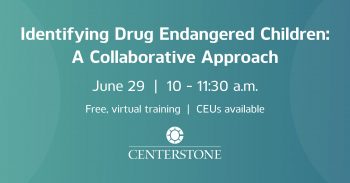Home / News & Events /
Identifying Drug Endangered Children: A Collaborative Approach, free, virtual training

Centerstone, a nonprofit health system specializing in mental health and substance use disorder treatments, will host a free, virtual Identifying Drug Endangered Children: A Collaborative Approach training on June 29 from 10-11:30 a.m.
Ignored, abused, and abandoned – these are some of the chronic conditions experienced by children raised in environments where there is substance use, manufacturing, cultivation and distribution. Drug-endangered children are part of a very large, and growing population of children whose lives have been seriously and negatively impacted by dangerous drugs. Thousands of these children across our country go unnoticed and do not receive the necessary care and treatment to heal from these abusive environments. If ignored and left unsupported, these children continue to be victims caught in a cycle of drug abuse. The primary challenge with illegal substance abuse and drug-endangered children is in aligning the agencies and systems responsible for preventing, intervening, and treating these issues to increase the chances of better outcomes.
Objectives of the training include:
- Understand the many opportunities (often missed) to identify children living in dangerous drug environments and the benefits of intervention at the earliest possible point when endangerment is suspected to reduce physical and psychological harm to children
- Gain awareness about drug endangered children and the risks they face so that professions interacting with these victims recognize the need to facilitate multi-disciplinary, collaborative responses to better meet the needs of these children
- Learn what a multidisciplinary collaborative response looks like and how it incorporates the unique and often limited resources within a community and applies them in a manner that provides better care for drug endangered children
The presenter of the training will be Amber Anderson, the prevention specialist with Prevent Child Abuse Illinois.
This training has 1.5 hours of continuing education approved for IL LCPC / LPC, IL LCSW / LSW, and IL Nursing (LPN, RN, APN) under IDFPR Professional Counselor CE License No. 197.000263 and IDFPR Nurse CE Sponsor License No. 236.000184.
For more information, contact Megan Ragan at megan.ragan@centerstone.org or call 1-877-HOPE123 (1-877-467-3123).
This training is sponsored by Centerstone’s Trauma, Treatment and Training (CT3) program.
Other CT3 training events in 2022 include:
- May 25 – Road to Resiliency
- June 29 – Drug-Endangered Children
- July 27 – Child Sexual Abuse Prevention
- Aug 31 – Trauma 101
- Sept 28 – Adverse Childhood Experiences (ACEs)
- Oct 26 – The Effects of Domestic Violence
- Nov 30 – Road to Resiliency
- Dec 14 – Secondary Trauma
“CT3’s aim is to increase access to trauma-focused treatment for children, adolescents and their families who have experienced traumatic events, including children and adolescents involved in the juvenile justice system and children of veterans,” said Ragan, CT3 Trauma Training and Care Coordinator.
The counties covered in the CT3 program include Franklin, Jackson, Madison, Perry, Randolph, St. Clair, Union, Washington and Williamson.
CT3 services include:
- Direct trauma and treatment services
- Therapy
- Care management
- Professional training and community education
- Outreach and engagement
- Screening and assessment
- Linkages to services and supports
CT3 develops and maintains local capacity to implement trauma-informed practices and provide evidence-based, informed trauma treatment interventions. The goals of the program are:
- Establish a community-based, culturally competent, quality, accessible program to provide and increase access to effective trauma focused treatment and services systems for children, adolescents, and their families who witness or experience traumatic events.
- Develop a sound infrastructure and increase community capacity to implement trauma-informed services for the focus population.
- Improve the health status and outcomes for young children – ages 2 to 9 years old, adolescents – ages 10 to 17 years old, and families as measured at intake, 6 months and discharge follow-up.
- Develop and disseminate a thoroughly documented model with measurable objectives for statewide and national replication and adoption.


